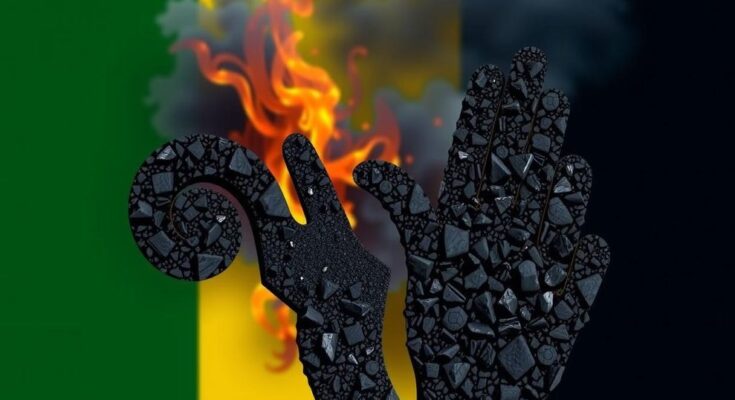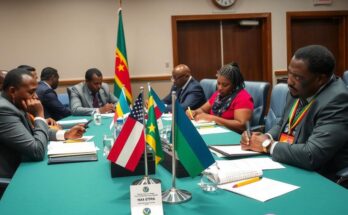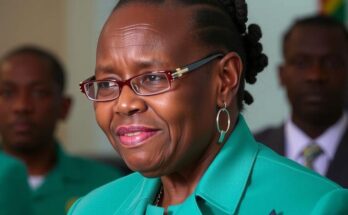Ghana’s illegal mining crisis, or “galamsey,” poses severe environmental and social challenges as the nation approaches presidential elections. Many miners engage in this dangerous activity due to poverty and lack of employment, resulting in degrading agricultural lands and water sources. Environmental activists advocate for a strong political response as candidates face public scrutiny regarding their commitment to addressing illegal mining and its impacts on the country.
In Ghana, illegal mining, commonly referred to as “galamsey,” poses significant ecological and socio-economic challenges, gaining attention in light of the upcoming presidential election. Amidst the search for gold, individuals like Frank, who operates in perilous conditions, exemplify the desperation of many miners driven by unemployment and poverty. Their actions have led to severe environmental degradation, impacting crucial agricultural sectors and drinking water sources. As voters prepare to elect a new president, the candidates’ stances on illegal mining could dramatically shape future policies and environmental protections.
The environmental toll of illegal mining in Ghana is an urgent issue, especially with the approach of national elections. The practice, which has been exacerbated by rising gold prices and a lack of job opportunities, has led to the decimation of fertile lands and contaminated rivers, severely affecting the livelihoods of many. Despite promises to end galamsey from the ruling New Patriotic Party, illegal mining activities have escalated, with over 19,000 hectares of farmland lost. As citizens express their grievances during this election cycle, the long-term sustainability of Ghana’s environment is at stake.
The backdrop of this predicament is the stark reality faced by many Ghanaians, particularly those involved in illegal mining. Ghana stands as a major player in gold production and cocoa exports; however, the environmental damage from illegal mining practices undermines these industries. Reports indicate that galamsey not only employs over one million individuals but also contributes significantly to the country’s gold output. Growing public discontent and environmental activism have incited protests, urging governmental accountability and effective strategies to safeguard their natural heritage.
“Instead of sending soldiers to destroy our equipment, they should create decent jobs for us. We don’t want to turn to crime to survive.” – Frank
“The impact on our environment is devastating” – Clement Abaidoo
“None of the parties have outlined a clear, enforceable strategy to tackle illegal mining” – Clement Abaidoo
As the election approaches, the need for thoughtful dialogue and cooperation among stakeholders remains pivotal for addressing the challenges posed by galamsey. Individuals like Frank express frustration over the lack of government support to transition to responsible mining practices. The political landscape appears divided, with voters demanding solutions that prioritize ecological sustainability and equitable job opportunities.
In conclusion, Ghana’s battle against illegal mining underscores a critical intersection of environmental integrity and economic survival. With the electoral outcome poised to influence approaches to galamsey, the voices of citizens engaged in mining will be crucial to shaping future policies. Ensuring collaboration among government, miners, and environmentalists is imperative for fostering a sustainable path forward that respects both livelihoods and the natural environment.
Ghana faces a crisis from illegal mining known as “galamsey,” where individuals extract gold, leading to environmental destruction and economic difficulties. The issue has intensified in the lead-up to the presidential election, reflecting the urgency of finding viable solutions. Many citizens rely on mining out of desperation, despite the harmful consequences for the land and water supply. As the electoral process unfolds, candidates are scrutinized for their plans regarding this pressing concern, which threatens Ghana’s ecological sustainability and agricultural industries.
The situation surrounding illegal mining in Ghana highlights the need for comprehensive political and economic reforms. With elections imminent, the responses from candidates will be crucial for addressing the complex dynamics of poverty, environmental degradation, and resource management. Voter sentiment indicates a desire for policies that promote not only resource extraction but also ecological preservation and employment stability. Ghana’s future hinges on responsible governance that prioritizes sustainable practices and engages all stakeholders in finding lasting solutions to the galamsey crisis.
Original Source: www.cbs19news.com




